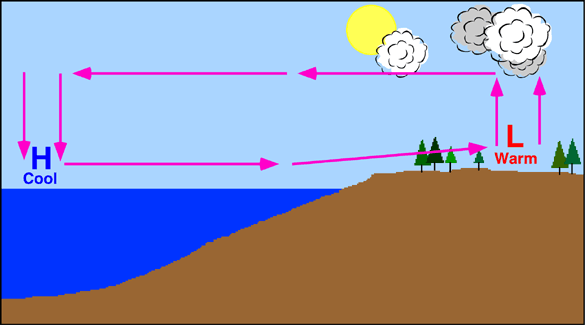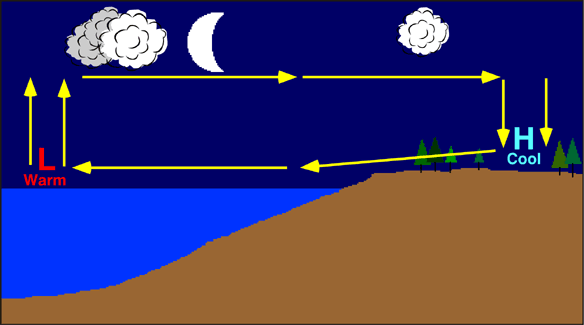Landmasses heat up more quickly than water bodies as it receives solar radiation from the sun, but also loses heat more quickly than water. So, in hot seasons, most especially at daytime, the sea or ocean remains cooler than the continent and therefore reduces the temperatures of adjacent lands. In cold seasons and at night, the sea remains warmer and therefore raises the temperatures of places close to it.
We can therefore say that the sea moderates the climate of the coastal areas by keeping the temperatures not too high and not too low, or at means.
On the other hand, the continental interiors are really hot during the hot season and during the day, but very cold during the cold season and at night. We say that the temperatures there are at extremes or the interior lands experience continentality.
Also places close to the sea experience land and sea breezes. During the day as the land gets heated up more quickly than the sea, the hot air over the land rises, and a local low pressure is created over it, and cooler air from the sea rushes to the low-pressure area to take the place of the risen air. this is known as sea breeze.

Source
At night, the sea retains its warmth longer than the land, the air over the sea rises, and there is a local low-pressure zone created over it. Air from the land then rushes to the low-pressure zone over the sea to take the place of the risen air. This is known as land breeze.

Source
Land breezes and sea breezes are responsible for increase in humidity levels, they cause higher precipitation and normal temperature in areas affected. When the winds are very strong it can result in thunderstorms.
Reference
http://www.ecn.ac.uk/what-we-do/education/tutorials-weather-climate/climate/factors-affecting-climate
https://www.toppr.com/bytes/land-breeze-and-sea-breeze/
http://www.physicalgeography.net/fundamentals/7o.html
http://www.bbc.co.uk/schools/gcsebitesize/geography/weather_climate/climate_rev3.shtml
You received a 80.0% upvote since you are a member of geopolis.
To read more about us and what we do, click here.
If you do not want us to upvote and comment on your posts concerning earth and earth sciences, please reply stop to this comment and we will no longer bother you with our love ❤️ https://steemit.com/geopolis/@geopolis/geopolis-the-community-for-global-sciences-update-3
Very interesting!
thanks
this is really nice... good research man
Super cool facts here @donfelix!
thanks
:D very well explained my friend :) and this applies not only to the sea but to lakes as well, pretty much big masses of water
Here in Southern California, we get the ocean or sea breeze most of the time, which is nice. But certain times of year we get hot desert winds blowing in from the inland high altitude deserts of Mojave and Palmdale.
When this happens, the hot, dry winds create fires, and it is becoming a huge issue down here.
yeah, so i see on the news. The increased wildfire occurence in Carlifornia is due to the drought.
References improved your work even more!